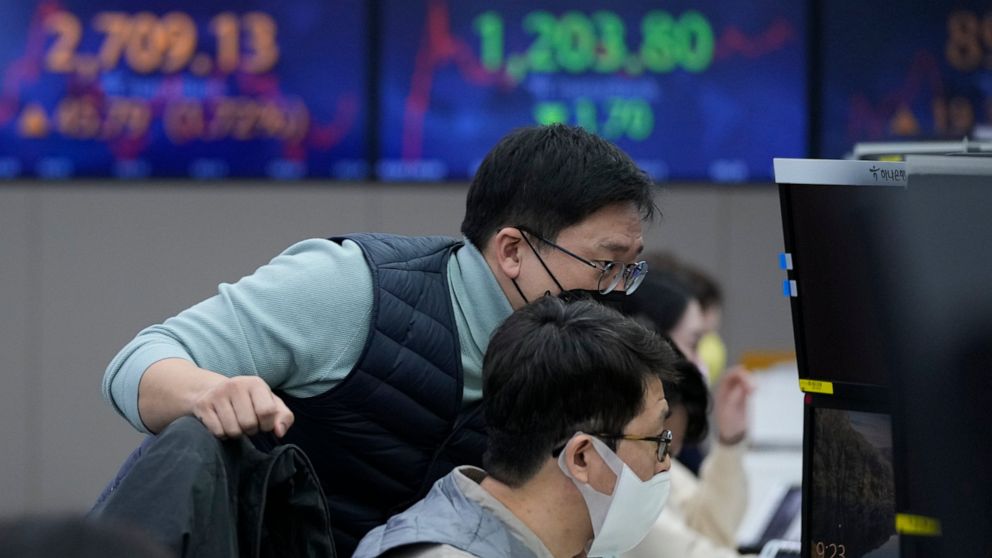Stocks fall as Facebook parent company Meta plummets 25%
Stocks are opening lower on Wall Street as Facebook parent company Meta plunges 25%, erasing more than $220 billion in market value, the largest drop in history
NEW YORK — Stocks are opening lower on Wall Street as Facebook parent company Meta plunges 25%, erasing more than $220 billion in market value, the largest drop in history. Meta sank after reporting a rare decline in profit due to a sharp increase in expenses. Meta also forecast revenue well below analysts’ expectations for the current quarter, a disappointment for a company that investors have become accustomed to delivering spectacular growth. The huge drop pulled the tech-heavy Nasdaq index down 1.9%. The S&P 500 also sank 1.3% and the Dow Jones Industrial Average lost 0.5%. Markets are coming off a four-day winning streak.
THIS IS A BREAKING NEWS UPDATE. AP’s earlier story follows below.
NEW YORK (AP) — U.S. markets pointed lower Thursday with tech stocks weighing down broader indexes after a weak quarterly earnings report from Facebook parent company Meta.
The numbers from Meta, released late Wednesday, checked a brief recovery in U.S. markets that have been under significant pressure this year. A sell-off on the tech-heavy Nasdaq composite could end four consecutive day of gains on the S&P 500 and the Dow.
Futures for the S&P 500 slipped 1%, while the same for the Dow Jones Industrial Average gave up 0.2%.
Meta tumbled 22% in off-hours trading after the social media giant spooked investors with a weak revenue forecast and higher cost projections. The company lost nearly $200 billion in value since the market closed Wednesday. Twitter, Snap and Spotify, other social media companies, were dragged down as well before the opening bell.
Investors also had their eyes on monetary policy updates in Europe, with the Bank of England raising interest rates for the second time in three months on Thursday, putting the United Kingdom far ahead of the rest of Europe and the U.S. in moving to tame surging inflation that is squeezing consumers and businesses.
The bank’s monetary policy committee boosted its key rate 0.5% from 0.25%.
In contrast, the European Central Bank doesn’t plan to raise rates until 2023 despite record inflation, blaming it on temporary factors. But it has decided the economic recovery is strong enough to start carefully dialing back some of its stimulus efforts over the next year. It also meets Thursday.
“Although ECB President Lagarde stated last week that the central bank has no motive to move as quickly as the Fed, pressure on the central bank to decrease support is increasing,” Naeem Aslam of Avatrade said in a commentary.
Germany’s DAX lost 0.5%, while the CAC 40 in Paris shed 0.3% as did Britain’s FTSE 100.
Oil prices fell after major oil-producing countries decided Wednesday to stick with their plan to just a bit more oil to the global economy. That will likely keep prices near their highest levels in seven years. The 23-member OPEC+ alliance opted to add 400,000 barrels per day in March.
U.S. benchmark crude oil lost $1.10 to $87.16 per barrel in electronic trading on the New York Mercantile Exchange. It had gained 6 cents to $88.26 per barrel on Wednesday.
Brent crude, the basis for pricing international oils, lost$1.02 to $88.45 per barrel.
In Asia, Tokyo’s Nikkei 225 index lost 1.1% to 27,241.31 while the S&P/ASX 200 gave up 0.1% to 7,078.00. Seoul’s Kospi climbed 1.7% to 2,707.82, catching up on earlier gains elsewhere after markets in South Korea reopened from holidays.
In other trading, the U.S. dollar fell to 114.84 Japanese yen. The euro was flat at $1.1293.
![]()


